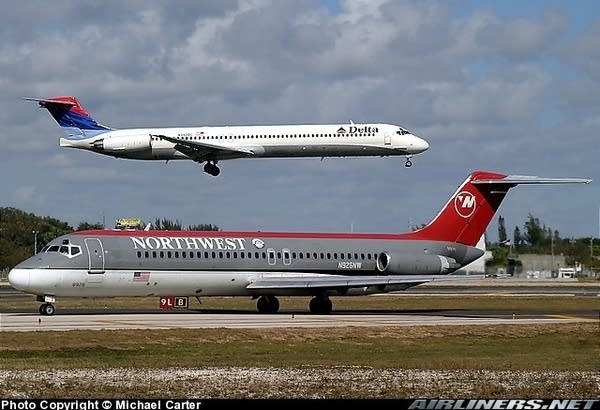How might antitrust regulators view a NWA merger?

Airline analysts have largely agreed that now is the time for a Delta/Northwest or Delta/United merger.
Philip Baggaley, an analyst with Standard & Poor's, says airlines don't really know how the Department of Justice would rule on a merger today, but they know less about the democratic or republican administration that will follow.
"So the devil they know in this case is better," says Baggaley. "And although the decisions on such things are made by professional officials, they're not necessarily political appointees, nevertheless, a predisposition to favor market solutions is more likely under the Bush administration probably than it would be in the next administration."
But the Bush administration doesn't just rubber stamp mergers, either. The Justice Department is taking a close look at an acquisition Northwest is currently involved in. Northwest and a private equity firm are seeking to buy Milwaukee-based Midwest Airlines.
Create a More Connected Minnesota
MPR News is your trusted resource for the news you need. With your support, MPR News brings accessible, courageous journalism and authentic conversation to everyone - free of paywalls and barriers. Your gift makes a difference.
Michael Waxman, a law professor and antitrust expert at Marquette University Law School in Milwaukee, Wis., says overall, the Midwest Airlines deal raises competitive issues largely in the Milwaukee market, where Midwest and Northwest have a lot of market share.
The deal allows Northwest to acquire the equity firm's stake in Midwest down the road and potentially absorb a competitor.
"What the real sticking point is, 'Wait a minute down the road you have the ability to buy out this entity and therefore acquire the interests of Midwest, and how much reviewability will we have at that point," says Waxman.
Waxman says those questions are very different from the ones that would bubble up in a Delta/Northwest or Delta/United merger.
But experts agree that the Midwest deal could nevertheless provide some insight into how regulators will assess questions that you might think would be fairly established by now, like what an airline market is.
Former U.S. Secretary of Transportation Jim Burnley says it turns out that such terms are a work in progress.
"You can look at the question of how easy it is for other airlines to enter markets where two carriers that are talking about merging are both major players, and what are the barriers to entry, and you have to think about how many gates are available at an airport," says Burnley.
Burnley says looking at how an airline merger might thwart competition in a market is far more complex than just sitting down and looking at the airlines' route networks. But routes are a key reason many observers think Northwest would be the better dance partner for Delta than United. The two don't compete on a lot of routes and a combination would be less likely to dominate many markets.
Market domination would be a concern to people like Ed Faberman, the executive director of the Air Carrier Association of America, which represents a number of smaller airlines. Faberman says those small carriers will be watching closely if any merger proposals do head to the Department of Justice anytime soon.
"We don't have a problem with carriers merging operations internationally and doing lots of things to combine, but if at the end of the day, combining two airlines is going to make it even more difficult for them to compete at certain hubs and govt won't do anything to counter that, that's the problem, that's not what deregulation was supposed to be," says Faberman.
And if a merger were to be controversial, that would likely pull Congress into the equation. Though the Transportation and Justice departments are the bodies that would sign off on a merger, Congress can hold hearings and try to exert political pressure.
